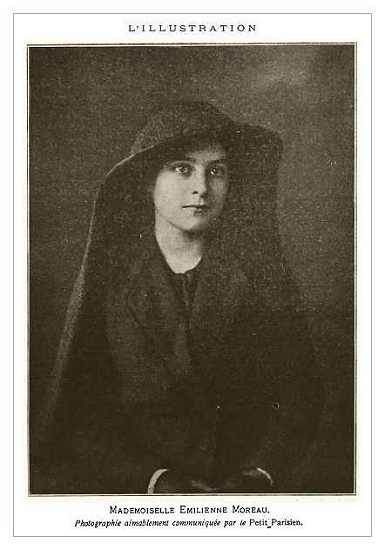Welcome to DU!
The truly grassroots left-of-center political community where regular people, not algorithms, drive the discussions and set the standards.
Join the community:
Create a free account
Support DU (and get rid of ads!):
Become a Star Member
Latest Breaking News
Editorials & Other Articles
General Discussion
The DU Lounge
All Forums
Issue Forums
Culture Forums
Alliance Forums
Region Forums
Support Forums
Help & Search
World History
Related: About this forumEmelienne.
'They almost made it out; but just as Joe was reaching for the handle, he heard the loud clacking sound of a French military revolver cocking its hammer, and his hand stopped in midair without touching the knob. Abbot froze, and he and Joe slowly put their hands up as a figure stepped slowly into the light.
It was a French girl, of no more than seventeen or eighteen. She was mildly pretty, with deep brown eyes and a noble cast to her features, but somewhat emaciated. The revolver looked as big as a cannon in her hand, but her grip was steady and her gaze unwavering. She said nothing. For a long moment, no one said anything at all. Abbot tried desperately to think of something, anything that could get them out from under that gun and through the front door.
“What’s your name?” Abbot asked, in French.'

Emelienne Moreau
'Émilienne Moreau-Evrard (June 4, 1898 – January 5, 1971) was a French heroine of World War I, a high-profile female member of the “Brutus” Resistance network during World War II and later, a member of the “Assemblée consultative provisoire”. Moreover, she is one of only six women recipients of the Ordre de la Libération.
…….
To save a British soldier who was under enemy fire in the village, she went out of her home with explosives and succeeded, with the help of some British soldiers, in forcing the Germans to flee from their position in the neighboring house. Later on, she shot two German soldiers though a closed wooden door. Eventually, the village was under the sole control of the allies.
Evacuated, she was awarded the Croix de guerre 1914-1918 with an army acknowledgement given directly by Marshal Ferdinand Foch and the Croix du Combattant by the French Army. Moreover, the British army awarded her the Military Medal, the Royal Red Cross (first class) and the Venerable Order of Saint John.
.......
After the war, she went back to the Pas-de-Calais in the north of France and got married in 1932 to the socialist activist Just Evrard. In 1934, she became the General Secretary of the women's socialist movement of her department.
When World War II was declared, Émilienne was living with her husband and her two children, Raoul and Roger, in the city of Lens. As with many people in northern France, they fled from the war zone, but after the French Armistice, she went back to Lens with her family.
Émilienne, who was famous for her former military actions during World War I, was quickly placed under house arrest in Lillers. However, she was permitted to return home after some time. There, in Lens, she started to distribute propaganda brochures against Marshal Philippe Pétain and his capitulation and made contact with the British Intelligence Service, giving them crucial information. At the end of 1940, Emillienne and her husband created a secret section of her socialist party in Lens.
Émilienne Moreau is known in the French resistance under two names: “Jeanne Poirier” and “Émilienne la Blonde”. She was in charge of linking “Brutus” in Switzerland with CAS (in English: Socialist Action Committee), combining this with some specific missions in Paris.
Then she joined the resistance movement named “France au Combat” (in English: “The Fighting France”) founded in 1943 by André Boyer. There she worked with Augustin Laurent, André Le Troquer and Pierre Lambert.
In March 1944, at Lyon, she was about to be arrested, following the case of the “85 de l’Avenue de Saxe”. In this affair, seventeen of her friends in the resistance network were arrested by the Gestapo. Two months later, still in Lyon, she escaped yet again from another series of raids by the Gestapo. In one of these, Nazi soldiers were waiting for her near her house and when they saw her, they fired in her direction but missed. She quickly escaped using a basement in the neighbourhood.
Now officially hunted down, she tried several times to escape to England, finally getting away on August 7, 1944.'